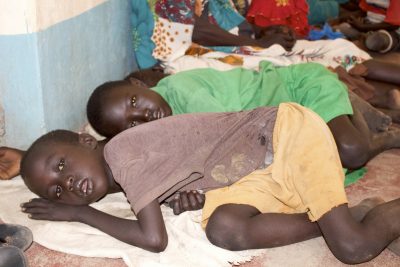By
Peter Louis
The World Food Programme (WFP) and UNICEF are intensifying their efforts to reverse the dire malnutrition situation in South Sudan, where a brutal conflict has displaced millions of people, destroyed basic services, increasing disease and exacerbating hunger.
UNICEF and WFP earlier this week launched an enhanced joint nutrition response plan, which will see both agencies and their partners assist over two million people – children, pregnant women and new mothers – in the treatment and prevention of acute malnutrition in the country until May 2016. The two agencies began the joint nutrition approach last year, and are embarking on the plan’s second year with a commitment to expand their lifesaving work.
“Every two minutes in South Sudan another child becomes severely malnourished. Last year we helped avert a famine. Now we must increase our efforts to avoid a catastrophic loss of young children’s lives,” said Jonathan Veitch, UNICEF Representative in South Sudan.
The renewed joint strategy is accompanied by a report showing that the action taken in year one by both agencies helped to avert famine and save lives by reaching one million people across the country through innovative methods, including joint rapid response teams in the conflict-affected states and ramping up the response in non-conflict states.
“In the first year we worked under extremely difficult conditions to bring much needed nutrition assistance to as many people and as many places in the country as we possibly could,” said Joyce Luma, the WFP Country Director and Representative in South Sudan. “Looking forward, we want to improve on the quality of nutrition services to continue to prevent and treat acute malnutrition.”
The joint nutrition response plan covers all states in South Sudan. It will look to engage more local and government partners and improve their capacity to treat malnutrition. The nutrition response plan will also work to address the root causes of malnutrition, such as poverty, adequate water and sanitation and infant and young child feeding practices.
Malnutrition in South Sudan is a chronic problem as well as the current acute emergency, and it is necessary to both focus on prevention and to deliver quality life-saving management of acute malnutrition to ensure the health of the next generation.
Rates of Global Acute Malnutrition (GAM) are still alarmingly high – well above the emergency threshold of 15 percent in most parts of the country – especially in the Greater Upper Nile States, Warrap and Northern Bahr el Ghazal. A quarter of a million children are severely malnourished.
While a peace agreement signed in August provides hope for the new country, basic health and nutrition services remain out of reach for much of the population. Since April, intense fighting has forced hundreds of thousands to flee into the bush or swamps for protection, where they are cut off from humanitarian assistance. Basic services that were re-established over the past year have been destroyed, including hospitals, clean water, nutrition treatment sites –both out-patient and in-patient facilities.
Since fighting broke out in December 2013, more than two million people have been uprooted from their homes in South Sudan, more than half of them children. Humanitarian agencies continue facing challenges to reach and provide sustained nutrition services to this affected population.
UNICEF and WFP’s lifesaving nutrition programme in South Sudan is funded by donors including, in alphabetical order, the European Commission, Japan, Norway, Switzerland the United Kingdom, and United States.
Meanwhile, Mr Valentino Deng, Minister of Education Northern Bahr El Ghazal stated in his official speech that “Everyday on our streets we have children that have nothing to eat and they have no home to find food and eat, they have no home to sleep; already the numbers of our street children have started migrating in Wau to search for what to eat and I am not sure if there is also enough food as well, so malnutrition is indeed a big problem affecting us.”



No Comments Yet!
You can be first to comment this post!